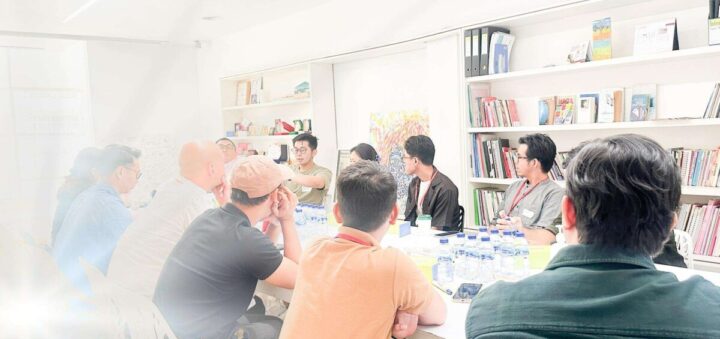Began in 2022, SAHABAT (Saling Hibur Antar Kerabat), originally designed as a general platform for anyone seeking emotional support through one-on-one sessions with life-coaches and counselors. The program aimed to offer a pre-professional venting space before individuals sought psychological or psychiatric care.
Recognizing the immediate needs of their existing patient base, the program initially focused on People Living with HIV (PLHIV/ODHIV). This shift allowed SAHABAT to address stigma, mental health struggles, and treatment adherence for a group facing systemic and personal challenges.
Under the leadership of Alfons Adrian and George Alains, and with Angsamerah Foundation acting as a catalyst, SAHABAT established itself as a trusted space for emotional healing. The program was guided by Kurnia Dwijayanto and supported by dr. Ratna Mardiati Sp.KJ (K), Sylvia Adriana, and Ratri Suksma, who provided expertise in mental health and community care.
By 2024, SAHABAT had evolved into the Peer Venting Group Discussion format, creating a structured space for shared experiences and collective problem-solving while retaining its commitment to serving broader populations in the future.
Why SAHABAT Peer Venting Group Discussion?
The Peer Venting Group Discussion builds on SAHABAT’s foundation by addressing the need for community-based support. Participants engage in structured, meaningful discussions, fostering solidarity and shared growth.
Key Features:
- Safe and Anonymous:
Participants share openly without judgment or fear of repercussions.
- Expert Facilitation:
Sessions are guided by trained counselors to ensure focus and constructive dialogue.
- Inclusivity:
Open to ODHIV, their partners, and support networks, while maintaining a vision to expand to general populations.
This peer-centered approach complements individual counseling, providing a collective platform for empowerment and mutual support.
Key Themes Discussed in SAHABAT Peer Groups
- Self-Acceptance and Open Status
- Participants explored the importance of self-acceptance and its role in fostering healthy relationships.
- Discussions highlighted that disclosing HIV status (“open status”) is a personal decision, shaped by cultural and social contexts, requiring thoughtful preparation and emotional readiness.
- Building Emotional Resilience
- The role of support systems—family, friends, or peers—in boosting self-esteem and adherence to treatment was emphasized.
- Participants without robust support systems shared strategies for independence and resilience.
- Navigating Relationships and Disclosure
- The complexities of disclosing HIV status were discussed, with participants emphasizing the need for preparation, timing, and professional guidance.
- Serodiscordant couples explored strategies for building trust and understanding in relationships.
- Innovations in HIV Treatment
- Injectable treatments such as Cabotegravir (PrEP) and Lenacapavir (ARV) were praised for their potential to improve adherence but recognized as financially and logistically challenging in Indonesia.
- Discussions around affordability and infrastructure reflected the need for advocacy and collaboration with policymakers.
- Addressing Stigma and Healthcare Barriers
- Internalized stigma remains a recurring theme, impacting mental health and treatment adherence.
- Participants highlighted systemic barriers, including stigma from healthcare providers, emphasizing the importance of inclusive training and education for medical staff.
- Expanding Awareness and Access for Youth
- Rising cases of HIV among youth aged 15 and older underscored the need for targeted prevention, education, and support services tailored to younger demographics.
- Mental Health and Community Support
- Participants shared how peer support helps reframe negative beliefs, reduces self-stigma, and provides emotional outlets for discussing challenges unique to ODHIV.
Impact on Participants
SAHABAT has brought transformative outcomes for its participants:
- Improved Adherence:
Participants reported enhanced commitment to ARV therapy, inspired by shared success stories and peer encouragement.
- Reduced Stigma:
Safe spaces for sharing experiences helped participants confront self-stigma and foster self-acceptance.
- Strengthened Relationships:
Couples found tools for trust-building and open communication, strengthening their relational dynamics.
- Community Building:
Participants formed networks of care and solidarity, reducing isolation and promoting empowerment.
Building on its success, SAHABAT will expand into three distinct programs in 2025:
- SAHABAT HIV
- Continuing as a safe space for ODHIV to discuss treatment, stigma, and mental health.
- SAHABAT MUDA (For Youth)
- Launch: January 2025
- Focus: Youth-specific challenges such as mental health, identity, relationships, and prevention education.
- SAHABAT PUAN (For Women)
- Launch: February 2025
- Focus: Women-centered topics including reproductive health, leadership, and navigating societal stigma.
These expansions reflect SAHABAT’s vision to serve a broader audience while continuing to address the unique needs of its core participants.
SAHABAT is not just a program—it’s a transformative movement combining emotional support, practical solutions, and community empowerment. By addressing systemic, emotional, and social challenges, SAHABAT empowers individuals to lead healthier, stigma-free lives.
As SAHABAT MUDA and SAHABAT PUAN take shape, the program will extend its impact to youth, women, and broader populations. With Angsamerah Foundation’s continued guidance, SAHABAT is poised to redefine peer support and transform HIV care in Indonesia.
Are you ready to connect, share, and grow? SAHABAT welcomes you to a community of support and transformation; The registration links are shared monthly via Instagram @angsamerahclinic or directly contact us at wa.me/628111636397 (Partner Notification).
